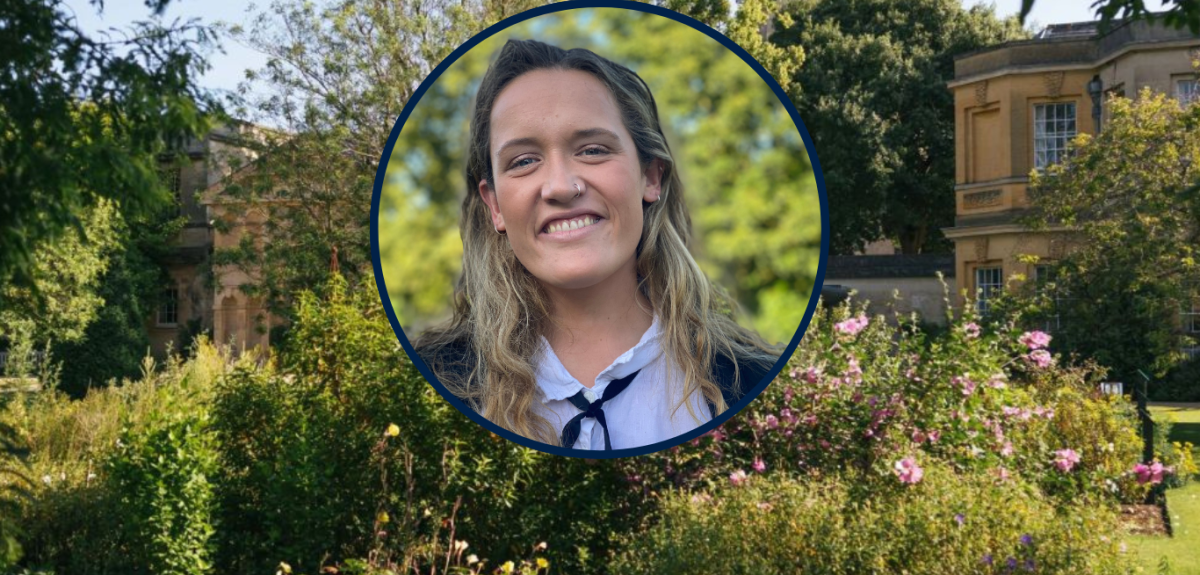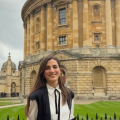
Student blog: Postgraduate study as a deaf student
Matilda Carnegie is a first-year student studying an MPhil in Politics Comparative Government at St Hilda’s. Matilda is profoundly deaf, relying on a cochlear implant to hear and has written about her experience to raise awareness for International Day of Persons with Disabilities this Sunday 3 December.
My name's Matilda Carnegie, and I'm a first-year student studying an MPhil in Politics Comparative Government at St Hilda’s. As someone who's disabled - I'm profoundly deaf and rely on a cochlear implant to hear - I like to write articles about my experiences and raise awareness for disability issues. I've been really lucky to be invited to write for the Week 8 Student News edition, just in time for International Day of Persons with Disabilities on December 3rd.
This day is all about raising awareness and taking action to support the disability movement. You know, a lot of people aren't sure where to begin when they encounter disability for the first time and don’t really know how act. So, I thought it would be helpful to share some university related anecdotes that show the difference between what to do and what not to do. Let's dive right into it!
My experience so far
So, let me start by sharing some of my experiences interacting with fellow students throughout my academic career. It hasn't always been a smooth ride, especially during the pandemic when I had just moved to the UK from Australia. There was a lot going on, and to make matters harder, everyone was wearing masks in class at my old university, which made lip-reading impossible for me.
As a deaf person, a big part of my language processing comes from reading the page, so sometimes I pronounce words based on how they look (like pronouncing the 'b' in 'subtle'). During a history class, we were discussing the readings, and I somehow mispronounced "Metternich." Instead of being understanding, one of the students was pretty rude about it, correcting me and even laughing. That incident left me feeling deflated, and it made me hesitant to contribute as much after that.
Student support
On the other hand, getting note takers or transcribers sorted for my classes at Oxford has been a struggle. But the support I've received from other students has been amazing. They often check in on me to see how I'm doing, and a few have even offered to send me their notes whenever I'm struggling to follow lectures. The key takeaway from this tale is that we all have unique ways of processing information and communicating. We all face different obstacles, sometimes invisible to others. So, it's important to give people a chance, even if their approach doesn't align with your own.
Adjusting after the pandemic
The second anecdote is about some of the amazing professors who taught and supervised me during the second year at my old university. It's not always easy to find the right balance between providing necessary accommodations for students and avoiding patronizing them or having low expectations. These professors truly went above and beyond to make the classroom accessible for me. Once the vaccinations were rolled out and it was safe, they asked students to take off their masks so I could lip-read. That made a world of difference for me.
Moreover, they were great at communicating expectations in a clear and concise manner, which was incredibly helpful for me. Sometimes people tend to beat around the bush or convey messages indirectly, which makes it harder for me to understand what they want. But these professors were direct and to the point, which I appreciated.
Getting the right support for me
In my second year at my old university, I was still recovering from the difficulties I faced in my first year and hadn't invested much time in my first essay. I just wanted to get through the second year without having to worry about essays again. Well, that mindset didn't lead to a great grade on that essay. My professor wrote on my paper that we needed to talk in person. During our conversation, she first asked how I was doing and how my move had gone. She could see that things had been difficult for me. Then, we dove into discussing the essay. She said to me that I had a good grasp of the content from my contributions in class but pointed out that I needed to work on structuring my thoughts.
I mentioned that I wasn't sure if I had the right kind of brain for academia, and she responded by saying that I would have to do similar work for clients and in the workplace, so it was important to learn how to do it now. She then proceeded to illustrate how to visualize the essay in my head and ensure a coherent flow, which resonated with me as a visual learner due to my hearing disability.
Getting the best out of myself
This experience was a perfect example of finding the right balance between acknowledging the difficulties I had faced, providing accommodations, while still holding me to a high standard and expecting me to do my best. It's frustrating when either no accommodations are made, or people assume that having a disability means you're incapable and don't expect much from you, neither approach works. But in this case, my professors struck the perfect balance of providing support but also challenging me to do high quality work. This approach meant that I could get the best out of myself and enabled me to rediscover my passion for learning. As a result, I had my interest sparked in pursuing further study, which led me to Oxford.
Hopefully through these anecdotes, some insight has been provided on what to do versus what not to do regarding disability and can give people guidance on how to proceed. Thank you so much for taking the time to read and let’s come together to celebrate International Day of Disabled Persons.
- Matilda.
The University's Disability Advisory Service provides information and advice on disability issues and facilitates support for those with, for example, sensory or mobility impairments, long-term health conditions, specific learning difficulties, autistic spectrum conditions or mental health difficulties.
 Student story: Finding space for Kosovo at Oxford
Student story: Finding space for Kosovo at Oxford
 Oxford students shortlisted as McCall MacBain Scholarship finalists
Oxford students shortlisted as McCall MacBain Scholarship finalists
 Student story: My time at Oxford has been deeply transformative
Student story: My time at Oxford has been deeply transformative
 Welfare blog: Dealing with imposter syndrome
Welfare blog: Dealing with imposter syndrome
 Student story: Rowing sabbatical officer
Student story: Rowing sabbatical officer